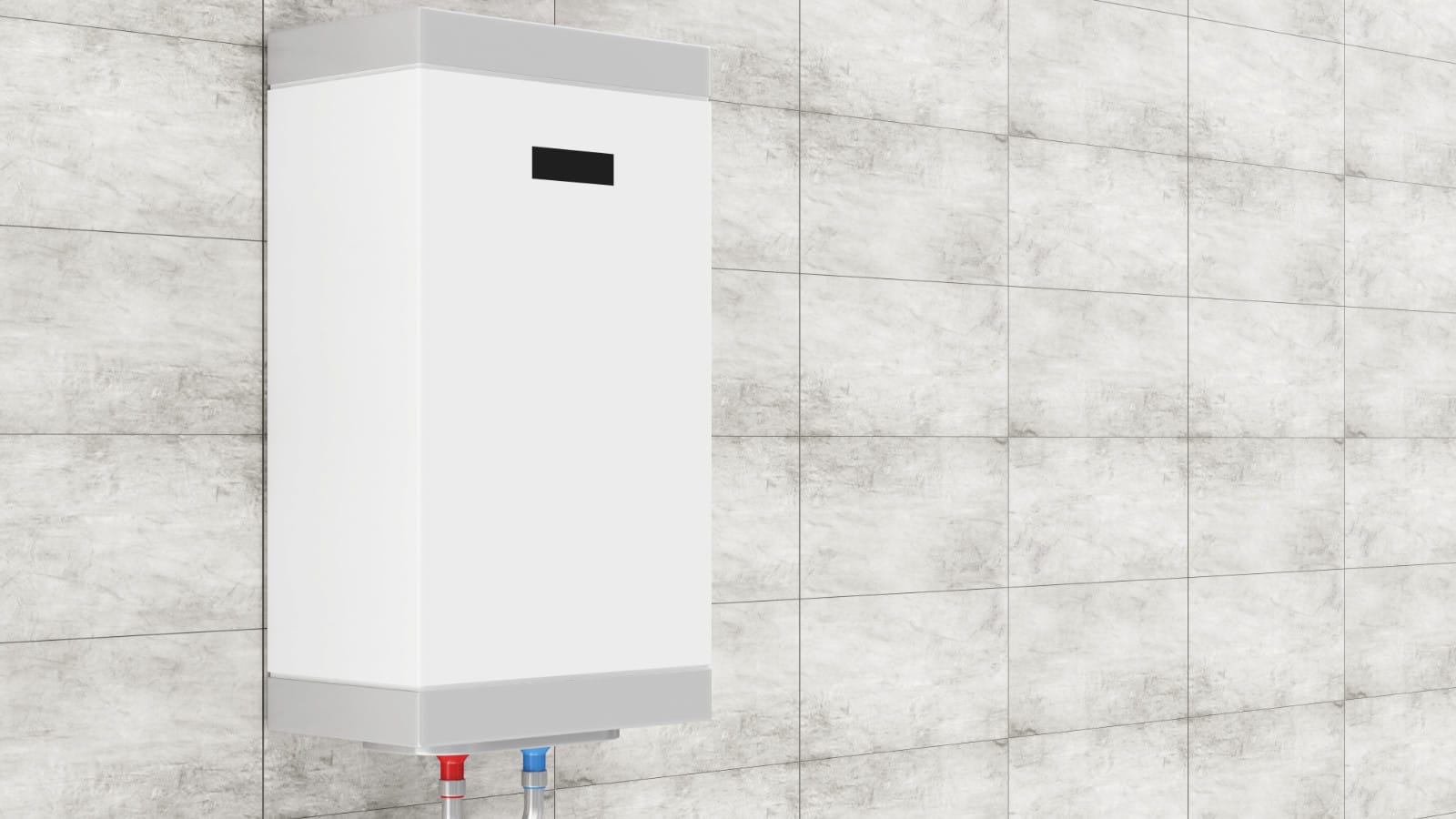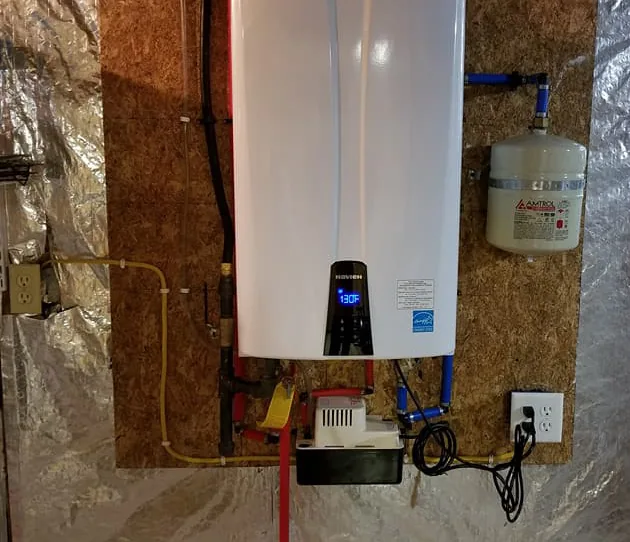My Manual To The Benefits Of Instant Water Heaters
My Manual To The Benefits Of Instant Water Heaters
Blog Article
Were you on the lookout for ideas concerning Pros and Cons of Tankless Water Heater?

In a globe where benefit and efficiency preponderate, it's not a surprise that house owners are regularly in search of smarter ways to manage their home's energy intake and comfort. One innovation that has actually steadily obtained popularity is the tankless water heater. But just what makes these systems stick out from the standard tank-based models the majority of us matured with? Allow's dive in and check out the benefits of tankless hot water heater, helping you make a decision if it's time to make the button in your home.
Introduction
Photo this: you enter the shower after a lengthy day, anticipating a calming cascade of hot water, just to be welcomed by icy droplets since the last person used everything up. Noise acquainted? Standard hot water heater save a set amount of hot water, meaning you go to the mercy of that storage tank's supply. Tankless systems, on the other hand, warmth water on demand. Say goodbye to running out mid-shower, no more wrestling with schedules just to guarantee warm water is readily available.
Recognizing Tankless Hot Water Heater
What Are Tankless Hot Water Heater?
Tankless hot water heater, often referred to as on-demand or immediate hot water heater, give warm water just as it's needed. As opposed to storing gallons of pre-heated water, these systems kick right into action the moment you turn on the tap. Water passes through a warm exchanger, heating up in real-time, suggesting you get a nonstop circulation of warm water without the demand for a huge container sitting lazily by.
Just how Do They Vary from Standard Solutions?
Traditional heating systems hold a reservoir of warm water, utilizing power to maintain that tank at a constant temperature. Tankless units get rid of the standing supply, cutting down on lost power and the cumbersome footprint of a big cylinder. Essentially, you're updating from a "accumulation" way of thinking to a "made-to-order" strategy.
Usual Kinds Of Tankless Units
Tankless water heaters normally are available in two ranges: gas and electric. Gas designs often tend to supply greater flow prices, suitable for larger households, while electric models often serve smaller homes and are commonly less complicated to mount. Furthermore, some systems are developed for point-of-use (offering one component) while others can manage the entire home's hot water needs.
Trick Advantages of Tankless Water Heaters
Power Effectiveness and Cost Financial Savings
No more warming a titan storage tank's worth of water and keeping it cozy all day. Tankless heating units decrease standby power losses, which can lower utility expenses. While the first cost might be higher, the long-lasting financial savings commonly justify the investment.
3. Space-Saving Design
If your home is short on storage, eliminating the cumbersome container liberates useful space. Tankless devices are portable and can typically be installed on walls, tucked away in edges, or set up in limited energy wardrobes without monopolizing the entire area.
4. Longer Lifespan
A well-kept tankless hot water heater can outlast its tank-based cousin. Traditional storage tanks might last 10-15 years, while tankless designs can maintain chugging along for 20 years or even more, making them a solid financial investment over time.
1. Unlimited Hot Water Supply
Ever before had to set up showers so everybody obtains their fair share of hot water? With tankless, that ends up being a distant memory. As long as the heating unit's flow capacity isn't gone beyond, you can take back-to-back showers without turning into a popsicle.
5. Improved Water Top Quality
Keeping water in a container can sometimes result in debris buildup or a slightly "off" taste. With tankless systems, fresh water is heated on the spot, minimizing the opportunities of debris accumulation and potentially providing cleaner-tasting water.
Factors to consider Prior To Changing
Though the advantages are compelling, it's a good idea to consider a couple of elements before fully committing.
Evaluating Your Home's Water Use Patterns
If your household simultaneously makes use of numerous fixtures with high warm water need, ensure the device's flow price fulfills your demands. Recognizing your use patterns aids you select the appropriate size and type of tankless heating unit.
Upkeep and Treatment Tips
Tankless systems are reasonably reduced upkeep, yet they aren't set-it-and-forget-it devices.
Normal Cleansing and Descaling
Tough water minerals can build up in the warm exchanger, influencing effectiveness. Regular descaling (usually advised every year) maintains the unit performing at peak performance.
Annual Expert Assessments
A yearly checkup from a professional ensures small issues are caught early. They'll evaluate the system's performance, search for leaks, and assist maintain optimum effectiveness.
Initial Financial Investment Costs
Tankless heating systems typically feature a higher in advance price. Between the system itself and potential installation alterations, the initial expense could provide you sticker shock. Yet bear in mind to view it as a long-term investment.
Installation Needs
Relying on your home's framework, you might require extra electrical capacity or gas line upgrades. Ensure you comprehend the setup requirements and speak with an expert to avoid surprises.
Making Certain Correct Air Flow
For gas designs, proper air flow is vital to safely expel exhaust gases. Make sure airing vent systems are clean and appropriately mounted to prevent any type of possible security hazards.
Contrasting Different Brands and Designs
Not all tankless hot water heater are developed equal.
Researching Dependable Manufacturers
Seek trusted brand names with a background of producing quality devices. A trusted maker often gives far better consumer support and longer warranties.
Installation: Do It Yourself or Expert?
While some homeowners delight in taking on projects themselves, tankless installation might not be the best time to break out the toolbox.
Benefits and drawbacks of DIY Installment
A DIY install could save cash, yet it features risks. Inaccurate installment can lead to ineffectiveness or safety issues. If you come in handy and have experience, it might be possible-- however proceed with caution.
Reading Evaluations and Individual Responses
Individual reviews and comments from neighbors or buddies that have actually gone tankless can use useful understandings. Occasionally, real-life experiences can be much more informing than advertising and marketing sales brochures.
When to Call a Specialist Plumbing Professional
For the majority of, calling a pro makes certain every little thing's done appropriately. A specialist plumbing professional recognizes local codes, sizing requirements, and airing vent criteria, lowering the danger of mishaps.
Maximizing Performance
You've invested in a tankless unit-- now maximize its efficiency.
Optimum Temperature Settings
Lots of people establish their units in between 120-140 F. Readjusting the temperature can improve convenience and cost savings. Experiment to discover a wonderful area that does not squander energy.
Pairing with Low-Flow Fixtures
Intend to stretch your system's capabilities? Think about mounting low-flow showerheads and faucets. They minimize water usage, enabling your tankless system to deliver a stable stream of hot water without stressing.
Ecological Effect
Tankless hot water heater straighten with greener living objectives.
Decreased Carbon Footprint
By using much less energy and just home heating water as needed, tankless systems can reduce your home's carbon impact, lowering your ecological impact.
Preserving Natural Resources
Less power usage and less lost warm water convert right into less natural resources being used, an ecological win-win.
Who Profits A Lot Of from Tankless Heaters?
The elegance of tankless heating systems is that they can match a variety of houses.
Big Families vs. Single Passengers
Big families might enjoy the endless hot water supply, while single residents appreciate the energy cost savings from not warming a whole container for simply a single person's morning shower.
House Owners with Minimal Area
If your home is short on square video footage, shedding the bulky tank liberates area for various other basics-- or perhaps just extra breathing space.
Eco-Conscious Customers
Going tankless aligns with environmentally friendly values, guaranteeing you're not losing power or resources.
Future Patterns in Tankless Water Heaters
The world of home appliances is ever-evolving, and tankless water heaters are no exception.
Innovations in Technology
R&D is frequently improving heat exchangers, making systems much more effective and resilient. Future versions might be even quieter, more portable, and far better matched for varying climates.
Smart Home Combination
Think of changing your water heater's temperature using an application or receiving upkeep alerts on your phone. As smart home tech advancements, we'll see more connectivity and ease.
Verdict
Choosing a tankless water heater is more than simply updating your home's warm water system; it's purchasing long-term comfort, power performance, and a greener way of life. By considering your home's water usage, bearing in mind installment demands, and committing to normal upkeep, you can delight in a constant stream of warm water without the luggage of a large storage tank. As innovation evolves, you can eagerly anticipate even smarter, much more efficient tankless options that not just make your life simpler however likewise profit the world.
Why You Should Consider a Tankless Water Heater for Your Home
Energy Efficiency and Cost Savings
Tankless water heaters, also known as on-demand water heaters, heat water only when needed. This means they don't waste energy keeping a tank of water hot constantly. This efficiency translates into substantial cost savings on your monthly energy bills.
Endless Hot Water Supply
One of the significant advantages of tankless water heaters is their ability to provide a continuous supply of hot water. Traditional tank water heaters have a limited capacity and can run out of hot water, especially during peak usage times. In contrast, tankless water heaters can provide an endless stream of hot water, making them ideal for larger families or homes with high water usage.
Space-Saving Design
Tankless water heaters are compact and take up significantly less space compared to traditional tank heaters. They can be installed on walls, under cabinets, or even outside, freeing up valuable space in your home. This makes tankless water heaters a great option for smaller homes or properties with limited space for a traditional water heater.
Longer Lifespan and Lower Maintenance
Tankless water heaters typically have a longer lifespan compared to traditional tank heaters. They can last up to 20 years or more with proper maintenance. Additionally, tankless systems are designed with replaceable parts, which can extend their lifespan further and reduce long-term maintenance costs.
Environmentally Friendly
Reducing energy consumption not only saves you money but also benefits the environment. Tankless water heaters contribute to a smaller carbon footprint by using less energy to heat water. Their energy efficiency and ability to minimize standby heat loss make them an eco-friendly choice for environmentally conscious homeowners.
Customized Temperature Control
Tankless water heaters offer precise temperature control, allowing you to set the desired temperature to meet your specific needs. This level of customization ensures you always have water at the perfect temperature for your comfort and usage requirements.
https://beantownservices.com/blog/consider-tankless-water-heater-for-your-home

I stumbled upon that piece of writing on Pros and Cons of Tankless Water Heater while doing a search on the web. Loved our piece? Please quickly share it. Help others discover it. Many thanks for taking the time to read it.
Estimate Free Report this page